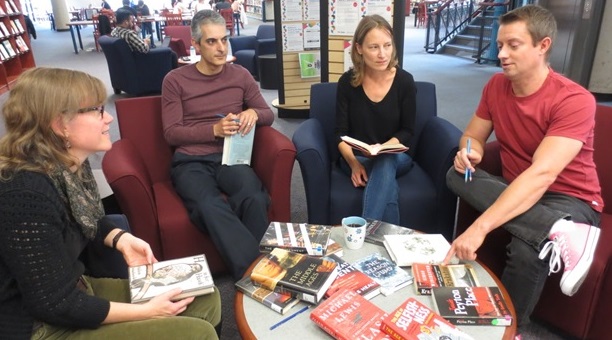Little, Brown and Co., 2008
For me, Gladwell
makes two main points in Outliers, and the remainder of the book is populated
with engaging, interesting, and thought provoking anecdotes and examples to
help illustrate these points. The first
is that people become experts in their fields only through the application of
10,000 hours of dedicated practice. This is a good opportunity to do some math - how long is 10,000 hours anyways? If you practice something weekly - say 3 hours per week, it would take you around 64 years to reach 10,000 hours. On the other hand, if you practice 3 hours per day 365/year, it would take around 9 years.
The
second point is that people who become outliers (a term Gladwell uses to identify the
super-successful people - those who jump way ahead of the pack), can only do so
if they happen to be situated in a context that will allow them to thrive - such as being a specific kind of person born in a specific time and place. So these given outliers would invariably have
been in the right place at the right time to be able to practice their 10,000
hours in a meaningful way, and then be in a position to capitalize on it when
it matters. By extension, the outlier
would necessarily need to be an expert in their field at the exact time and
place when someone in that field is in high demand by society. One does not become an outlier if no one
cares about your field of expertise, or if you have no opportunity to declare
to the world that you are the expert they need.
You will note that nothing in the above indicates that one must be a genius, or have exceptional personal qualities beyond the capacity to diligently put in the grueling 10,000 hours of practice. Gladwell makes the point that the person just needs to be "good enough!" This immediately makes me think of what I could potentially become an expert in if I put in the practice.
So in all a
very fascinating read. Malcolm Gladwell
writes in a very accessible style about topics that he makes the reader
interested in, regardless of what they may have thought before.
About his
work Gladwell writes, "nothing frustrates me more than someone who reads
something… and says… 'I don’t buy it.' …Good writing does not succeed or fail
on the strength of its ability to persuade.
Not the kind of writing that you’ll find in [my books], anyway. It succeeds or fails on the strength of its
ability to engage you, to make you think, to give you a glimpse into someone
else’s head."
I find the book convincing, but even if you have some doubts about his thesis, the book is always engaging, and it is certainly thought provoking.
I find the book convincing, but even if you have some doubts about his thesis, the book is always engaging, and it is certainly thought provoking.
Discussion Questions
- The book contains many examples of luck - social conditions and situations lining up just right, so that well-positioned people can become uber-successful and become "outliers." What do you think of this notion of luck? Is there such a thing as destiny?
- What do you think of the idea of "accumulative advantage?"
- What is an advantage that you have benefited from?
- What is the role of community in a person's life? What does community mean?
- Do you see any cultural legacies being played out in society?
- Do the privileges and advantages Gladwell cites seem as decisive as he claims?
- How big a role does individual merit play in someone’s success?
- Have you done 10,000 hours of practice in any field?
- What do you consider fulfilling work? Does this match with Gladwell’s ideas?
- "To build a better world we need to replace the patchwork of lucky breaks and arbitrary advantages that today determine success… with a society that provides opportunities for all." Do you agree with this statement? Could/should society be changed as Gladwell suggests?


No comments:
Post a Comment